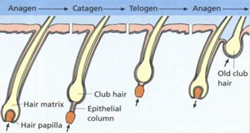What is Electrolyis?
Electrolysis is safe, effective, progressive and permanent method of hair removal. Indeed it is the only truly permanent method, ideally suited to clients with a mix of hair or white hair.
How does Electrolysis work?
A fine probe (about the size of an eyelash) is inserted into the hair follicle where a tiny burst of energy is targeted at the hair root. This prevents nutrients feeding the hair and so it becomes finer and weaker. After repeated treatments the hair is no longer able to grow.
Electrolysis is a commitment in time and money as multiple treatments are required, treatments can be booked in a block or paygo.

What causes unwanted Hair?
Unwanted hair is almost certainly hereditary or hormones related, add in stress or certain medications and you have unwanted hair growth.
How Many Electrolysis Treatments Will I Need?
Many factors influence hair growth, so you will need to return for several electrolysis visits. The total number of sessions needed to remove hair permanently from a particular area will vary from person to person. Most clients return once a week or every other week as needed.. Each treatment lasts between 15 minutes and one hour.
How many treatments will I need?
The number of treatments will vary from person to person and will be discussed at the initial consultation.
The first sign the treatment is working is the hair becomes softer, finer and lighter in colour. You will feel the difference throughout your treatments and appointments will get spaced out.
You will need to follow some aftercare to support your treatment, this is usually given verbally and in a leaflet form.
How Do I Choose an Electrologist?
Electrologists are people who have special training to perform electrolysis. If you are considering electrolysis, it is important that you do your research before committing to sessions. The wrong decision can mean extra sessions and cost along with unnecessary discomfort and scarring.
- Know the professional’s qualifications.
- An NVQ level 3 is a minimum qualification here in the UK
- Ask around.
- Get a consultation.
- Use common sense.
This is just my take on it but its always good to have a guide, thanks for reading Mary x
